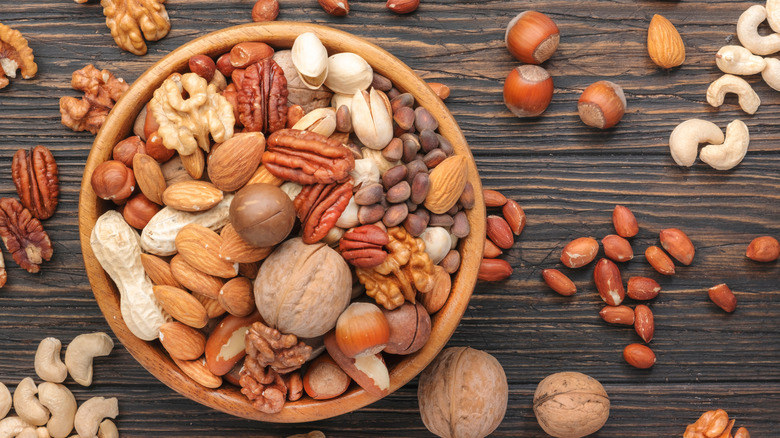Foods That Can Cause Greasy Stool
When you use the bathroom, you may notice periodic changes in your poop. Bowel movements occur when stool is passed through the digestive tract, completing the process of digesting food by ridding the body of waste, bacteria, and unabsorbed bits of food, among other components, per MedicalNewsToday. If you consume something unusual to your regular diet, you may notice temporary changes in stool consistency, appearance, and strength of odor. Normal bowel movements are typically passed daily and appear brown in color, though not everyone poops daily. Knowing what causes various changes in excrement can inform you if your bowel movements are indicative of the foods you've eaten or concern for medical attention. In particular, the color of your poop can tell you a lot about its composition. For instance, stool with excessive fat in it may appear yellow in color.
A stool that contains too much grease or fat can culminate in a condition called steatorrhea, according to WebMD. Also known as fatty stool or fecal fat, steatorrhea occurs when the body doesn't fully absorb the nutrients and fat from food that passes through the digestive system. The improper or lack of fat absorption can lead to malabsorption, which can be a sign that one or more organs involved in the digestive process aren't functioning properly. When malabsorption causes steatorrhea, symptoms may include pain, stool with an overly foul odor, excessive gas, indigestion, or greasy stool, like diarrhea. To avoid steatorrhea, here are foods that can cause greasy stool.
Limit steatorrhea-causing foods
Steatorrhea occurs when stool contains a surplus of grease or fat, which results in poop that is pale in color, has an intensely repugnant odor, and floats to the top of the toilet bowl's waterline with noticeable grease surrounding stool, per a 2022 article from StatPearls Publishing. Overly fatty poop can be instigated by chronic medical conditions, like celiac disease and exocrine pancreatic insufficiency, but in the absence of a steatorrhea-causing diagnosis, the culprit of greasy stool is often rooted in food consumption. MedicalNewsToday reports that nuts, coconut oil, fish, like tuna that's high in fat and oil, whole wheat, and palm kernel oil are common items that lead to steatorrhea. Foods with artificial fats and overindulgence in alcoholic beverages can also provoke steatorrhea.
The experts at the Cleveland Clinic warn that steatorrhea can indicate that your body isn't correctly breaking down fats, which can lead to potential organ damage if left untreated. The longer steatorrhea persists, the more likely harm to multiple organs can become a reality. If you're able to connect greasy stool with foods you've recently consumed, try to limit those items or take them out of your diet entirely. In addition to nuts, palm and coconut oil, excessive alcohol consumption, and fatty fish, foods that may lead to steatorrhea comprise red meat, butter, and similar food items, like lard and shortening, and processed creamers. Consult with your healthcare provider if you can't identify the cause of greasy or painful bowel movements.
Non-food causes of steatorrhea
Should you experience greasy stool that you can't relate to specific food items you've consumed, then there is a chance that an underlying medical condition could be the cause, according to MedicalNewsToday. Steatorrhea can be instigated by, or be a symptom of, a plethora of medical diagnoses. Among the conditions that can lead to steatorrhea, some are chronic medical experiences that can be managed alongside a healthcare team, while others can be cured with proper treatment. Common medical conditions known to provoke steatorrhea and greasy bowel movements include Crohn's disease, celiac disease, cystic fibrosis, diabetes, hypoparathyroidism, and damage or failure of the liver or kidneys. Some medications can also lead to steatorrhea, particularly prescription medications used to treat diabetes, manage obesity, and lower cholesterol. In the case you experience steatorrhea as a side effect of a medication, you can speak with your doctor about potentially switching to a different medication.
Steatorrhea's hallmark symptoms of oily, greasy stool that either floats or appears bulky and difficult to flush can also be an indication of an underlying condition, per Healthline. If you notice newfound trends of greasy stool, be on the lookout for other symptoms of chronic steatorrhea, such as weight loss and frequent, painful cramping. Severe symptoms of steatorrhea, like fever, fatigue, anemia, or sudden impairments to eyesight or brain function, shouldn't be ignored either (via NetMeds).



